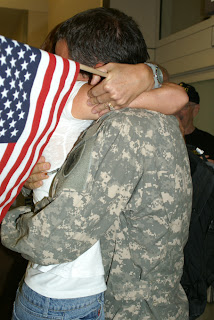by Elizabeth
I can't resist a good deal, and so when
my favorite yogurt place offered a small for just a Bicentennial quarter over the holiday weekend, I dug through my stash of change and found enough to keep me in frosty heaven through the sweltering
holiday. By Monday, I was sated enough to be generous, and so donated the last coin to my son so he could indulge in a cup of boysenberry.
Into the shop we went, and noticed the new signs the yogurt company had provided. They looked fresh, clean, and were good competition for the influx of new treat shops around town. Guilt-free, they proclaimed, and I'm telling you, that yogurt is. Low cal, tasty (peanut butter is my favorite. Peanut butter!!!), and a great stop when with a diabetic pal, there is nothing but satisfaction in that cup of yogurt.
But there was never any guilt, I realized. Guilt? Over food? I dumped that a long time ago.
My first real internet commitment was to
Weight Watchers, and for nearly a decade I was a daily poster on the chat boards. That was my meeting, and it's where I honed the new skills that has kept my weight happy for longer than my kids have been in public school. But better than that, it's where I learned and later preached good sense (you can ask the Women: I'm a Weight Watchers evangelist, even now). And one major bit of wisdom is and was this: no one should ever feel guilt over food. It's fueling your body, and if you eat too much, well, then you did. But guilt? No way.
And here's another that has long irked me: when people (women, right?) say they are "bad" because they ate a gooey brownie or pizza or a plate of enchiladas. All delicious, all things that I enjoy and have from the time I began losing the weight I've yet to re-find. Here's the deal: what you eat has no bearing on whether you are good or bad. If you kill puppies for fun, then yeah, I'd call you a bad person; if you eat a hot fudge sundae...you ate a hot fudge sundae. Our morality is not tied to our stomachs, and people who dump that mindset are more likely to have a healthy relationship with food and their bodies. Period.
Sure, there are foods that should be eaten with greater moderation. That's just good sense. We need fuel, we don't necessarily need M&Ms or fettucini alfredo. But eating them does not make us bad, no more than exercising with reason rather than spending four hours in the gym seven days a week makes us good. (Can you imagine? I can barely drag myself there four hours a
week.) Consider it in non-physical terms. What we eat determines our value no more than how long it takes us to paint our nails. If I use the quick dry polish and am out of there in two minutes flat, a sloppy job leaving spare paint bleeding onto my toe skin, am I any less "good" than the woman who walks out of a salon after an hour and a half with silky feet and perfect digits? Neither of these activities has anything to do with our value as humans, and I can't think of anyone who wouldn't scoff if such an idea was suggested. So why do we do that with food?
Ah, but what does this have to do with writing? Sorry about that: my days as a Weight Watchers pontificator got the best of me.
I wanted to say this: reading that "guilt-free" sign made me realize that while I absolutely do eat that yogurt without guilt, that's true of everything I eat, and I fervently believe that should be true for everyone, always. However, this is 2011, and the reality of a comfortable life is that many people still struggle with that. But as my son spooned up his treat, I realized that for me, that yogurt is angst-free. That's a better word for it. And I realized it better caught the meaning of what it is people (women) deal with over food.
Guilt versus angst. The latter is a better description of what I'd hope people (women) would feel if they have to feel anything at all over what they eat.
Guilt: the fact or state of having committed an offense, crime, violation, or wrong, especially against moral or penal law; culpability.
Food? A crime? No, no, no. Better:
Angst: an acute but nonspecific sense of anxiety or remorse.
All right: I don't love acute, but this is more like it. You ate something, you wish you hadn't, you feel some remorse, and
you move on. That's it.
In writing, what a difference. And there are plenty of other examples. Jealous, envious. Similar, yet different, and so often we rely on the former when really the latter is what we mean. I'm certainly envious of Pamela's quiet good sense and Susan's higher purpose in her work, but do I resent them for it? No, but if I did, then I would be jealous.
As writers, we deal with words. It's imperative--scratch that: important--to choose the correct one. Several of the Women here are nearing submission of manuscripts, and red pens and tracking changes have been busy helping them finalize. I know that there have been many instances when I've suggested an alternative word, and sometimes that suggestion will be taken, sometimes discarded, and that's fine. (Really, Joan: it's fine!) The point is, words matter, precision matters, choice matters.
Though if we do choose the wrong word, that's okay. No guilt allowed.















